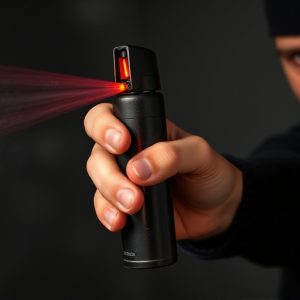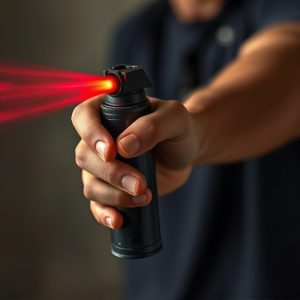Treating Pets Exposed to Pepper Spray: Symptoms & Comprehensive Care Guide
TL;DR:Pepper spray irritates pets' eyes, noses, throats, and respiratory systems, causing cough…….
TL;DR:
Pepper spray irritates pets' eyes, noses, throats, and respiratory systems, causing coughing, sneezing, and difficulty breathing. Immediate action includes rinsing eyes with warm water for 15 minutes and seeking veterinary care for severe symptoms or respiratory distress. Treatment may involve eye drops, oral meds, and supportive care. Prevent exposure by cleaning high-touch areas and ensuring good ventilation. Swift rinse and vet care are crucial if pets come into contact with pepper spray.
Personal safety is paramount, especially when facing dangerous situations like those involving inflammatory pepper spray. This article explores the essentials of understanding and addressing pet exposure to pepper spray. We delve into the science behind this powerful agent, its effects on animals, and practical steps for immediate care and long-term treatment. Learn effective prevention strategies to safeguard your pets from the harmful impacts of pepper spray, ensuring their well-being in unexpected scenarios. Discover crucial insights on Treating Pets Exposed to Pepper Spray for a comprehensive guide.
- Understanding Pepper Spray: What It Is and How It Works
- The Impact of Pepper Spray on Pets: Symptoms and Immediate Care
- Treating and Managing Pet Exposure: A Step-by-Step Guide
- Prevention Strategies: Keeping Your Pets Safe from Pepper Spray
Understanding Pepper Spray: What It Is and How It Works
Pepper spray, officially known as oleoresin capsaicin (OC), is a non-lethal self-defense agent designed to temporarily incapacitate an assailant by causing pain and irritation. It’s a natural compound derived from chili peppers, concentrated for use in personal defense products. When activated, pepper spray creates a cloud of fine droplets containing OC, which irritates the eyes, nose, throat, and skin, leading to temporary blindness, coughing, and difficulty breathing. This rapid response allows users to escape potentially dangerous situations.
While primarily focused on human safety, understanding how pepper spray works can also inform treatment if pets are exposed. If your pet comes into contact with pepper spray, whether during an outdoor walk or a confrontation, immediate action is crucial. Treating Pets Exposed to Pepper Spray involves rinsing the affected area thoroughly with water for at least 15 minutes to dilute the chemical. Seeking veterinary care is essential, as they can provide specialized treatment and ensure no long-term effects from the exposure.
The Impact of Pepper Spray on Pets: Symptoms and Immediate Care
When it comes to personal safety, pepper spray is a powerful tool, but its impact on pets can be significant. If your pet is exposed to pepper spray, whether accidentally or during an emergency situation, it’s crucial to understand the symptoms and act swiftly for effective treatment. Pets, especially dogs, can experience severe irritation of the eyes, nose, throat, and respiratory system after exposure. This can lead to coughing, sneezing, difficulty breathing, excessive drooling, tear production, and redness or swelling in the affected areas.
Immediate care is critical. Rinse your pet’s eyes gently with warm water for at least 15 minutes to flush out any residual spray. If respiratory distress occurs, seek veterinary assistance promptly as it may indicate more severe internal irritation. Provide a calm and quiet environment to help ease their discomfort. Treatments may include topical eye drops or ointments, oral medications to manage coughing or inflammation, and supportive care to ensure their comfort while the effects of the pepper spray subside.
Treating and Managing Pet Exposure: A Step-by-Step Guide
If your pet is exposed to pepper spray, it’s crucial to act quickly and methodically. First, move your pet to a well-ventilated area to prevent further inhalation of the irritant. Next, immediately flush their eyes with clean water for at least 15 minutes, ensuring thorough irrigation. This step is vital to dilute and wash away any remaining spray. After flushing, assess your pet’s condition. Look for symptoms such as eye irritation, coughing, or difficulty breathing. If severe reactions like these occur, seek immediate veterinary care.
For minor irritations, you can apply a mild, pet-safe lubricating eye dropper to soothe the eyes and nose. Keep your pet calm and comfortable during this process. It’s recommended to monitor their behavior for any signs of distress or unusual activity in the following hours as a preventive measure. If symptoms persist or worsen, consult a veterinarian who can provide additional treatment options tailored to your pet’s needs. Remember, treating pets exposed to pepper spray requires swift action and gentle care to ensure their well-being.
Prevention Strategies: Keeping Your Pets Safe from Pepper Spray
Pepper spray, while an effective tool for personal safety, can pose a significant risk to pets if they come into contact with it. Cats and dogs are particularly sensitive to capsaicin, the active ingredient in pepper spray, which can cause severe irritation and even long-term health issues. To keep your furry companions safe, prevention is key. Regularly cleaning high-touch areas like doorknobs and light switches with a vinegar solution can help eliminate any residual spray lingering in your home. Additionally, ensuring proper ventilation during outdoor activities where pepper spray might be used can reduce the risk of pets inhaling irritants.
In the event that your pet is exposed to pepper spray, immediate action is crucial for Treating Pets Exposed to Pepper Spray. Rinse the affected area thoroughly with warm water and seek veterinary care promptly. Symptoms may include excessive panting, tearing, itching, or difficulty breathing. Professionals recommend using a mild cleanser and following up with a soothing solution to treat the irritation. It’s important to remember that every pet is unique, so consulting a veterinarian for personalized advice on managing and preventing future incidents is highly recommended.
Understanding how pepper spray impacts pets is crucial for effective treatment and prevention. By recognizing symptoms and taking immediate action, pet owners can ensure their furry companions receive the best care after exposure. Following our step-by-step guide on treating and managing pet exposure, and implementing preventive strategies, you can significantly enhance your pet’s safety from pepper spray incidents. Remember, prompt action is key when it comes to Treating Pets Exposed to Pepper Spray.


